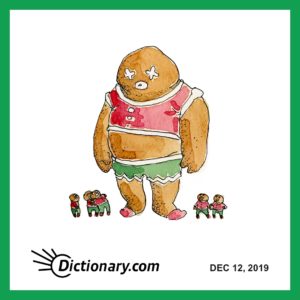Word of the Day
Brobdingnagian
adjective
of huge size; gigantic; tremendous.
More about Brobdingnagian
The adjective Brobdingnagian, “enormous in size, immense, gigantic,” derives from the noun Brobdingnag, the land of the giants, the second of the exotic lands that Lemuel Gulliver visited as recorded in Jonathan Swift’s Gulliver’s Travels. Just as Lilliput and Lilliputian sound small and cute, so Brobdingnag and Brobdingnagian sound clumsy and heavy. Brobdingnagian entered English in the first half of the 18th century.

how is Brobdingnagian used?
… the entire space will be given over to a single Brobdingnagian sculpture—“Reverse Curve,” back-to-back plates that form an S-shape and wind, riverlike, for 99 feet.
Since the launch of the Kepler telescope, scientists have discovered that the boiling, Brobdingnagian planets are in fact rarities and are just simpler to spot than cold, rocky planets.
More about forby
All the senses of the adverb forby are archaic, obsolete, or Scottish. Middle English forbi, meaning “past in space, past in time,” is formed from the adverbs and prepositions for—better, fore—“before” and by “nearby, close at hand.” German has the closely related adverb vorbei “past, gone, over (with).” Forby entered English in the 13th century.
how is forby used?
Forby, he had a bashfu’ spirit / That sham’d to tell / His worth or wants ….
Ither laddies a’ oot playin’ at something, an’ forby it’s no healthy to sit too lang aye readin’.
concinnate
verb (used with object)
to arrange or blend together skillfully, as parts or elements; put together in a harmonious, precisely appropriate, or elegant manner.
More about concinnate
The very rare verb concinnate,” to put together harmoniously, appropriately, or elegantly,” comes straight from the Latin past participle concinnātus “made ready, prepared, repaired, touched up,” from the verb concinnāre “to repair, set in order,” which has no known etymology. Concinnate entered English in the early 17th century.
how is concinnate used?
But first an explanation to concinnate my narrative.
I am glad you are trying to concinnate your nomenclature.